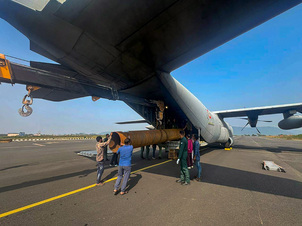New Delhi: The government is focusing on horizontal drilling to bring out alive all the 41 workers trapped inside the Silkyara tunnel in Uttarkashi and it may take less than three days to rescue them if no obstructions in the form of hard rocks are faced, senior officials said on Tuesday.
The officials also said that the process could take longer in case the horizontal drilling does not work out and some other methods are adopted to rescue the workers who have been trapped in the tunnel since November 12.
The officials said the government has undertaken a five-option action plan to rescue the workers.
Briefing reporters on the rescue efforts, Anurag Jain, Secretary of the Ministry of Road Transport and Highways, said that under the current circumstances “vertical drilling is the second best option”.
“Different efforts have different timelines,” Jain said, adding that the rescue operations are going on five fronts simultaneously.
When asked about the timeline, he said, “If everything goes well, it may take 2-2.5 days to rescue the trapped workers, in case no obstacles in the form of hard rocks are encountered during the horizontal drilling process.” Jain said right now the best international practice is to use horizontal drilling by using Augur boring machines.
“Under the current circumstances vertical drilling is the second best option,” he added.
Boring through the debris of the collapsed 60-meter stretch from the Silkyara end was put on hold on Friday afternoon when the American-made heavy-duty auger machine encountered a hard obstacle after about 22 metres He exuded confidence that all the workers would come out alive.
The operation, however, could take much longer, in case a drift inside the tunnel has to be made to rescue the trapped workers. This operation may take 10-12 days.
National Disaster Management Authority member Lt General (Retd) Syed Atta Hasnain said the horizontal drilling process could even take five days to complete the rescue mission.
He further said that the “focus is on horizontal drilling” as rock formation has created challenges for vertical drilling Hasnain further informed that the new six-inch wide pipeline will be used to provide warm food and medicines to trapped workers.
Currently, the survival ratio is being provided to the workers through the four-inch wide pipeline.
He also added that equipment will be pushed through the six-inch pipeline to ensure better communication with the trapped workers. This will also help in raising the morale of workers.
NDRF teams are doing rehearsal at the site to deal with any contingency that may arise during the course of rescue operations, Hasnain said.
According to press release from the Ministry of Road Transport and Highways (MoRTH), NHIDCL has resumed horizontal boring from the Silkyara end to rescue workers using an Augur boring machine.
Fabrication of a protective canopy for the drilling machine is underway, with modifications to the augur diameter and welding of the pipeline in progress, the statement added.
Five agencies namely Oil and Natural Gas Corporation, Sutluj Jal Vidyut Nigam, Rail Vikas Nigam, National Highways and Infrastructure Development Corporation, and Tehri Hydro Development Corporation have been assigned responsibilities.
For vertical drilling, SJVNL’s machine for the vertical rescue tunnel construction has arrived at the site, with installation currently underway. Machines are being transported from Gujarat and Odisha for this purpose.
THDC has initiated the construction of a rescue tunnel from the Barkot end, with two blasts already completed, resulting in a 6.4-meter drift. Three blasts per day are planned.
ONGC is mobilizing machinery from the USA, Mumbai, and Ghaziabad for vertical boring.
RVNL is transporting machinery for micro-tunnelling through horizontal drilling to rescue labourers. Additional backup machines are being brought in from Odisha.
The Silkyara tunnel, about 30 km from the district headquarters of Uttarkashi and a seven-hour drive from the Uttarakhand capital Dehradun, is part of the ambitious Char Dham all-weather road project of the central government.






